So I Wait for the My Life to Become Interesting Again Mad Men
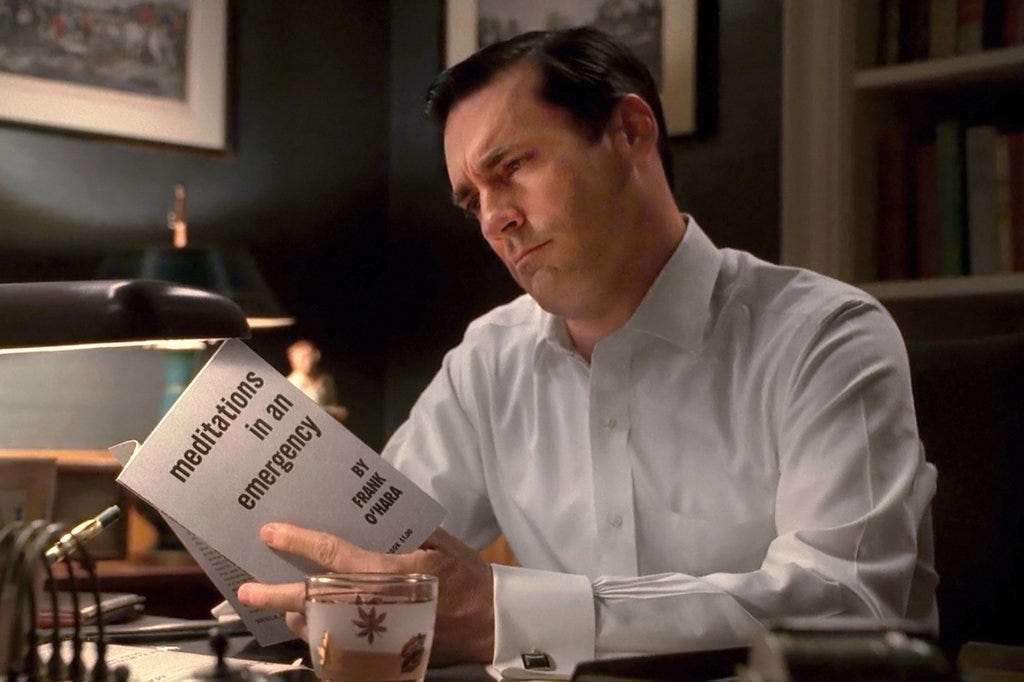
This is PopPoetry—a newsletter/blog-type-situation by Caitlin Cowan that you tin larn more than nearly here. If you like what you read and would exist interested in having more than popular upwardly in your inbox, consider sharing this slice and subscribing.
Information technology seems like the world is ending. Truly. I know that every generation feels this way, and I suppose that this is my moment: the twin pandemics of COVID-19 and racial injustice rage on while the sitting U.S. President continues to deny the seriousness, or fifty-fifty the beingness, of either. We are days away from an election that has the potential to improve the situation or go far much, much worse. Unfathomably worse.
And if every generation has moments when it truly feels that the world is at an end, in the 1960s, one of those moments was the Cuban Missile Crisis. Matt Weiner's well-heeled period drama Mad Men memorably captures the anxiety of this moment in its Season 2 finale, "Meditations in an Emergency," which takes its proper noun from New York poet Frank O'Hara's 1957 collection.
Every bit a nation in the midst of our own unprecedented emergency, we might be able to meet some of ourselves in O'Hara'south book and in history, even if that history is a fictionalized business relationship of an event that took identify in 1962. Beggars tin can't be choosers, after all.
If y'all've never watched Mad Men, kindly bookmark this mail service, rampage it on a streaming service at least through season two, and then come back when you're ready. Seriously: it's that expert. Only for everyone else who's ready to think near this accomplished show, its involvement in consummate New York poet Frank O'Hara, and our current emergencies, pour yourself a potable or seven and have a seat.
Unless you have a graduate degree (or two) in poetry (Howdy!), y'all probably know O'Hara as a poet of another kind of calamity or not at all. Frank O'Hara (1926–1966) was an American poet nigh associated with the New York schoolhouse. He is known for his approachable, "I do this, I do that" poems that chronicle the lived experience of a commencement-person subjectivity. His work is steeped in the sights and sounds of NYC, and his tragic adventitious death at the summit of his powers has cemented his identify in the world of poetry fifty-fifty farther.
O'Hara's work bookends Flavor 2 of Mad Men: Don meets a stranger reading Meditations in an Emergency in a bar in the season premiere, and the season finale is named afterward the slim volume. The season premiere also contains a voiceover of Jon Hamm reading some of the book's concluding poem, "Mayakovsky." But the collection resurfaces in the penultimate episode every bit well, when nosotros discover that Anna Draper was the one who Don mailed Meditations in an Emergency to in S02 E01.
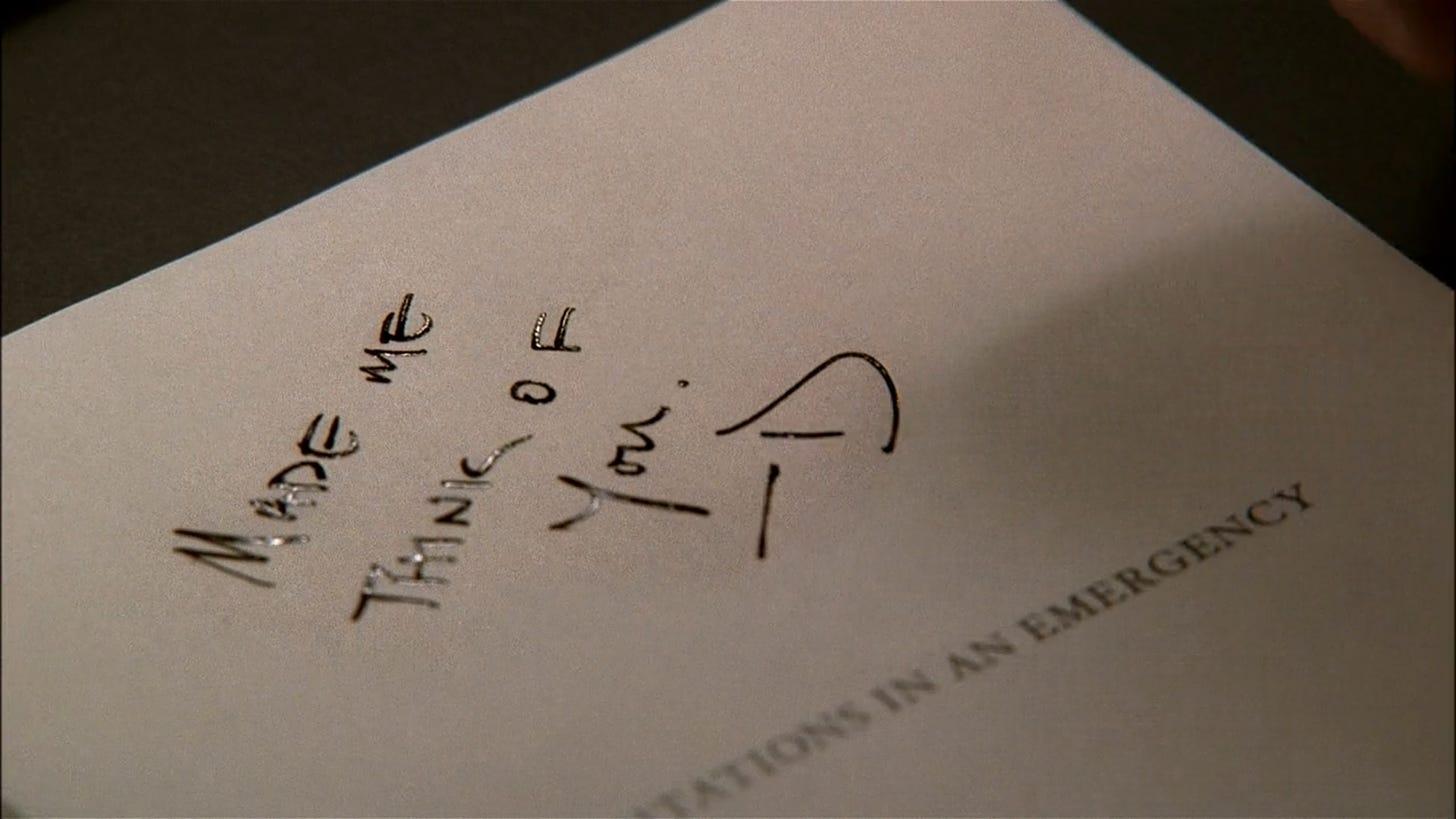
Season 2 will see Don philandering, every bit he then ofttimes does. The strictures of "traditional," highly gendered, cis-hetero-patriarchal marriage in the 1960s particularly enabled this kind of behavior (not that it's a thing of the past), and Don isn't even married to someone who knows who he really is (and quite literally: nosotros're still a season away from Betty discovering the so-called "Dick in a box"). When Betty is made aware of his most recent affair in the centre of Season 2, she withdraws from him in a kind of weak-willed separation. When Anna and Don come up face to face up, Don admits that he is in the middle of a private crisis. "I have been watching my life," Don says. "I keep… trying to get into it. I tin can't."
Things are in limbo: something bad is happening, simply very slowly. Something worse might still happen, but it hasn't happened yet. To me, this feels very much like the situation in which we notice ourselves in the U.Due south. today.
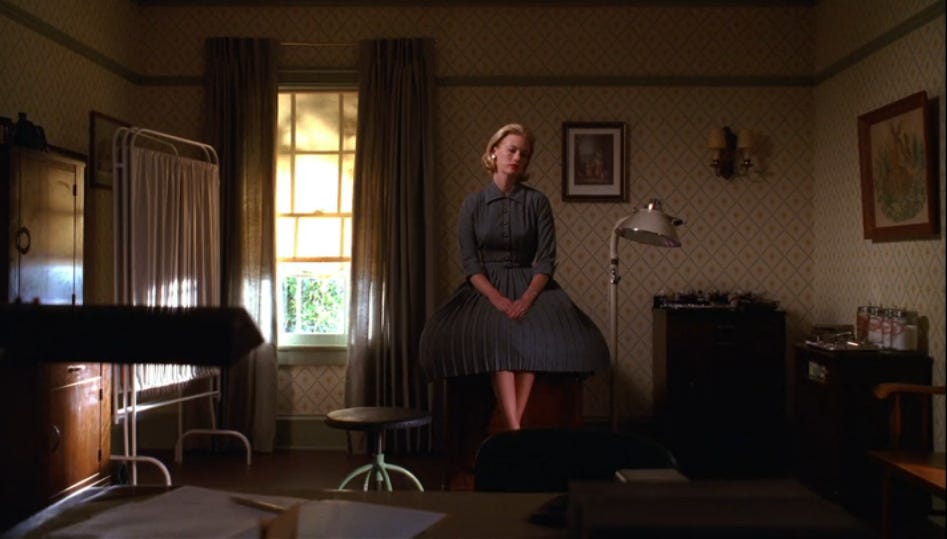
In the Season 2 finale, Betty also finds out she's pregnant at the meridian of her strife with Don. Pregnancy itself is a class of waiting, a broad apparently of stillness between the twin crises of orgasm and birth. And Betty'southward waiting is made heavier and more than poignant because she does not desire the child.
These situations are the soil in which O'Hara's volume, introduced to the states at the first of the flavor and recalled again near its end, grows, if crookedly.
The word "meditation" and the discussion "emergency" are opposites, at to the lowest degree kind of. For those with a lot of verse vocab, I think of their juxtaposition as a kind of "slant" connotation (e.g., shut, but not quite). Meditation requires usa to suspension, to hold still; emergencies oft demand quick activity. O'Hara's title, "Meditations in an Emergency," requires us to recall well-nigh the intersections of the personal and the societal, about thoughts versus actions, and virtually how all these things are the aforementioned.
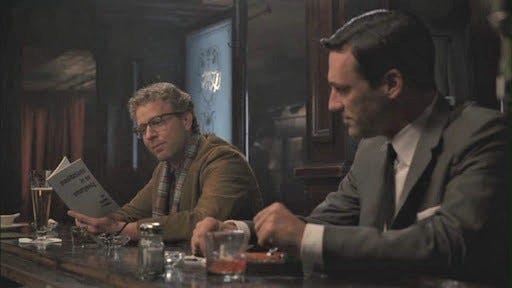
This is such a disquisitional episode in the show's evolution. Pete tells Peggy that he loves her. Peggy reveals her pregnancy and Betty hers. Betty fully grapples with her damaged marriage and cheats on Don, in an human activity of reclamation and power, for what we are to assume is the starting time time. The Cuban Missile Crunch, a distillation of the anxiety of the 1960s, looms big. Don returns from the left declension that keeps pulling him back from New York throughout the serial [as a quintessentially New York poet, O'Hara is a fitting choice for Don's homecoming).
All these emergencies are personal, but they are all set against the backdrop of an enormous national danger. Does this experience familiar to you, 2020 America? Wearing a mask feels like a personal decision, but when that decision has exponential ramifications for spreading a virus throughout one's community, that decision's linkage to public life becomes clearer. And when personal choices affect the public (which is always, to my mind), they go political. The Season 2 finale, in particular, and O'Hara'south collection as a whole, asks us how we navigate the personal and the political, how we function when the world outside is merely every bit fucked up as our inner worlds are.
For O'Hara, 1 reply to that vexing set of questions might be, nosotros wait. In "Mayakovsky," an excerpt of which Hamm masterfully reads aloud in the episode'due south last moments, O'Hara writes:
Now I am quietly waiting for
the catastrophe of my personality
to seem cute over again,
and interesting, and modern.The country is grey and
brown and white in trees,
snows and skies of laughter
always diminishing, less funny
not simply darker, non just grey.It may be the coldest day of
the year, what does he think of
that? I mean, what practice I? And if I practise,
peradventure I am myself once again.
When O'Hara writes, "what does he think of / that? I mean, what do I?" the stream-of-consciousness style belies the speaker's existent problem: he's constantly thinking, very straightforwardly, most other people's opinions earlier his ain. When I read "And if I do," I hear an accent on the I. If I do. In other words, if I tin get a grip on myself, if I can be the i who thinks of myself rather than letting others practice my thinking for me, "perhaps I am myself again."
Suppose we can re-locate the eye of our experience every bit our own accurate selves rather than our projections (remember social media). What would happen? If we can bring that truthful self to bear on the world, mayhap information technology can be a balm for the pains we experience. If Don can refocus his attending on his family, perchance he can become whole. If he can stop viewing himself through the optics of others—a learned tactic he uses as a suit of armor to protect the identity he stole during the war—he volition grow. The verse form he reads seems to resonate with him, so much so that we become the voiceover of O'Hara's poem while Don walks the canis familiaris equally a cover for his real task: mailing the sharp little book of poems to Anna like a cannonball.
Matt Weiner has discussed his reasoning for including the volume in the show in the first place. His comments put me in listen of Rupi Kaur, who has washed a great deal to increment poetry readership in general and especially among young people but remains controversial among literary circles for her insipid hot-have haikus nearly love and loss. I'grand reminded of a 2017 interview withThe Cutting where Kaur approaches a book of Kafka at NYC's legendary bookstore The Strand and announces, "This guy is the best." However, she's not talking about Kafka; she's talking about the guy who designed the volume'south encompass.
That was a magical occurrence. I had studied poesy in higher, and I read a lot of verse, but I did not know Frank O'Hara. My wife took me to an exhibit between the first 2 seasons at the Museum of the City of New York and they had individually printed pieces of paper where yous could read some Frank O'Hara poems. So I had one of these folded up in my pocket and it led me to think that Don, who was experiencing boredom after recommitting himself to his family, runs into this guy who just says he's a accommodate, he's a button-downwards guy.
In my mind, Don bought the book 'Luncheon Poems.' But that had not come out yet, so we had to use Meditations in an Emergency. I read a little bit of it and said, nosotros'll utilize this. It has a great cover, it'southward very period, it was definitely a popular book.
We put information technology into the episode and then at the end, Kater Gordon, who was the writer's assistant at the time, said, 'Don't yous think he should read some of it? Don't you retrieve we should hear it?' And I had not read the whole volume. So I sat downwards and read that last poem, 'Mayakovsky,' and I said 'What? This is the story of the season!' It was exactly related to how Don felt in that episode. I wish I could act like it was planned that way, but it wasn't."
—MATTHEW WEINER
"'MAD MEN' and Its Dear Affair With '60s Popular Culture," NYT, April 3, 2015
Weiner was drawn to the volume's aesthetic rather than its contents, only in a happy accident, he found that the volume's ruminative qualities mirrored his characters' struggles. Part of me is overjoyed past Weiner's admission that the precise selection of the book was a "happy accident," but that feeling is dulled by his admission that he hadn't even read the book (!) before putting information technology on screen.
I read and re-read Weiner'due south statement: "In my mind, Don bought the book 'Lunch Poems.'" In my mind. Weiner imagines a 1960s guy reading a 1960s book. Lunch Poems, chock with pop culture references and images of New York City, would take been, possibly, a simpler choice. A more obvious selection. And it was what Weiner had originally envisioned. In the prove's world, Don certainly could go on to read Dejeuner Poems after it was published in 1964. But equally is the instance in poesy, constraint (e.g., historical time, facts) produced creativity for Weiner, who ended up finding a better poetic friction match for the malaise of these characters.
In the terminate, I'k glad that Matt Weiner actually deigned to open upMeditations, read 1 of O'Hara'due south poems, and find resonance between "Mayakovsky" and the "story of the season," as he termed it. The exposure thatMad Men potentially gave O'Hara, and poetry in general, is immense. The viewership for the episode that bears the proper noun of O'Hara'south 1957 collection totaled around 1.75 million people, and seasons 5–vii would garner northward of 3 million viewers for its premieres and finales. This mass medium beaming poesy into people's homes, fifty-fifty fleetingly, makes me happy. And more than importantly, it has the potential to open up doors to poesy for novices and new readers.
Enormous platform aside, his anecdote of how Meditations came to be so important in the show illustrates a duality that's inherent to all discussions of "pop" culture. On the ane hand, when Weiner, like Kaur, focuses so heavily on the artful of books, of the associatedobjets d'fine art that books can sometimes become, he substantially fetishizes poetry in a style that is no better than beret-sporting, finger-snapping cartoons. (To be off-white, I kind of dig snapping at readings.) In other words, he makes information technology weird and niche.
Simply on the other hand, as I say and so often in this space, whatever it takes to bring people to art, man. We know nosotros aren't supposed to, but we gauge books past their covers all the fourth dimension. Sometimes that leads to amazing things! I may have even bought my first volume of poetry because the painting on the front intrigued me (which reminds me… a whole post on that NYC poet and his ain pop-cultural intersections is in lodge). Sometimes the pitch that a embrace makes has far-reaching effects. Information technology can find new audiences.
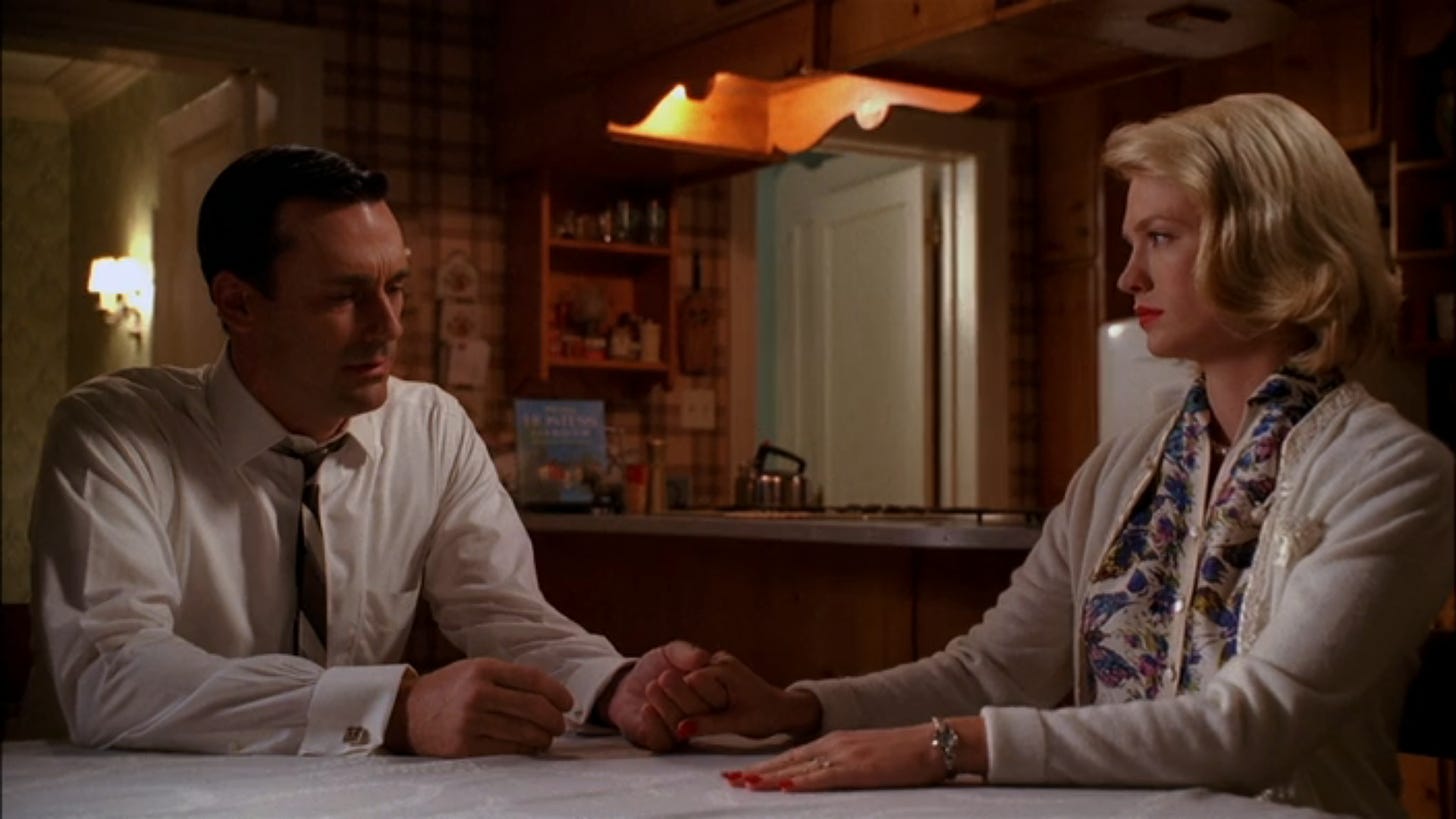
Like the poet, the advertising human being is consistently tasked with speaking about and to his ain time. He must situate personal concerns and questions—the strivings and desires of consumers—in their larger culture. So, too, does the show ask us to think almost Betty'due south pregnancy crunch confronting the properties of a push button for women's rights, about Don'southward desire for a détente with his wife against the white-knuckle doubtfulness of a missile scare. It's marvelous to watch the prove make these moves and use O'Hara'south wonderful book every bit a tentpole.
If you lot, too, are interested in the collection'south aesthetic, it is indeed possible to discover some copies (at a toll, of course).
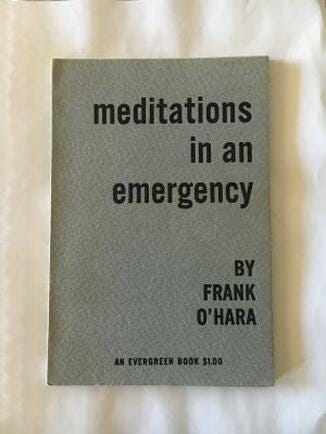
A Grove Press offset edition similar the one Don reads in S02E01 is available for a cool $1,890. I also wonder if the show has driven up prices for this snazzy, minimalist original printing.
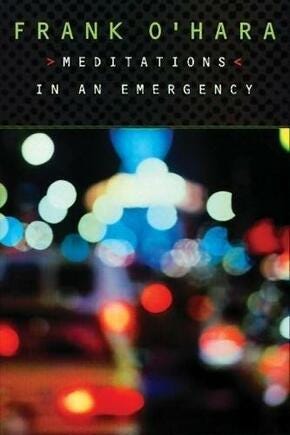
If yous'd like to own the collection merely are looking for something in a more than feasible price range, The 1996 Grove Press reissue graces my bookshelf and is bachelor for $9 to $14.
In the title verse form of the collection, O'Hara writes:
Each time my heart is broken it makes me feel more audacious (and how the same names keep recurring on that interminable list!), only ane of these days in that location'll exist null left with which to venture along.
Very Don Draper, yes?
Without ruin, we can lose the impetus to rebuild; without crunch, nosotros tin can forget the sweetness of hard-won peace. O'Hara, time and again in the collection that weaves itself through Mad Men's second season, reminds u.s. that each fourth dimension nosotros face up an emergency, private or public, nosotros are blindingly, mercifully, still alive.
Subscribe if you'd like to have more writing similar this delivered to your inbox! If yous know anyone who might be interested in the kind of topics I've been writing nearly here, let them know or frontwards them a link! Thanks for reading.
morgansurionotely.blogspot.com
Source: https://poppoetry.substack.com/p/words-be-sick-as-i-am-sick